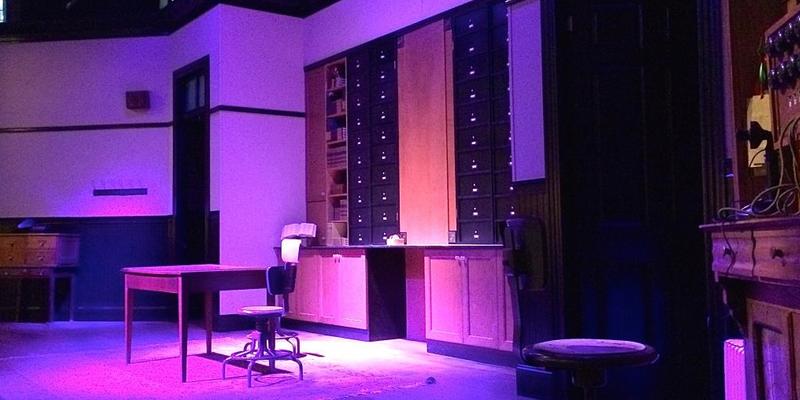
One thing that I learned very early in my time in Charleston is that you can’t go more than a day without stepping into a historic building.
This is a huge part of Charleston’s charm. Its age and the wizened, stately beauty that exists here is evident not only in the historic homes along South Battery, but in many popular restaurants, stores, libraries, and theaters. Such buildings display the Carolopolis Medal on their exterior. Over time, you start to notice the black metal badges given by the Preservation Society of Charleston, which are a subtle reminder of the history of the streets we tread daily. These awards are given ‘“to recognize outstanding achievement in exterior preservation, restoration, rehabilitation and new construction” to the individuals, the business, or the organization that owns the building at the time. The newest batch of awards was presented last week and included the Woolfe Street Playhouse, recently acquired by Keely Enright and Dave Reinwald of the Village Repertory Company, a non-profit theatre company founded over 15 years ago in Mount Pleasant. Built in 1914, the playhouse was originally the home of Meddin Bros. Meat Packing Company. Before being purchased by the Village Rep in 2012, it had been used off and on as a storage facility for The College of Charleston. With the help of the theatre community and friends (I helped paint the front office myself), Keely and Dave transformed the building into a beautiful theatrical space.
We’ve established that Charleston appreciates the ancient. I say ancient, though I always like to remind myself that America is a relatively young country. Ancient is a fitting word though, as it exudes that mysterious and wise quality that makes Charleston so alluring. I have found that this same quality exists within many theaters, not only in Charleston, but everywhere. Theatre as a craft and theatre as an event is as ancient a thing as any. Think Greek. So whenever I have performed in a show at Woolfe Street or watched a show there, I have always appreciated that we were in a building leftover from another time. Also, Keely, Dave, and Associate Artistic Director Robbie Thomas all seem to have a knack for selecting shows that will fit the aesthetic of their space. They use the exposed brick walls, the high, open-beamed ceiling, and balcony space to great advantage, resulting in incredibly visceral, all-encompassing sets.

London Wall by John Van Druten runs through Valentine’s Day and is a perfect example of Woolfe Street Playhouse’s brand. Set in 1930s London, the office set is a crisp creme and black and boasts a legitimate old-school telephone switchboard, which was reconstructed and refreshed by Dave Reinwald. The office shelves are filled with matching volumes of books, vintage telephones, and electric fans. Even the music playing at intermission and before and after the show sustains the illusion that until you walk out the door, you are a visitor to another time. The women of the cast, beautifully costumed by Julie Ziff, are powerhouse actresses and strut around the stage with so much sass that the men don’t have to try too hard to appear distracted. The women rule this show, no doubt about it.
The newest member of the workforce, Pat Milligan (McKenna Dubose), has fallen prey to the attentions of Mr. Brewer (Robbie Thomas), an associate solicitor. His constant cooing of pet names and sly side-eye glances would be enough to make any person, man or woman, feel creepy. Ms. Janus (Becca Anderson) doesn’t want to see Pat taken advantage of and urges her to pursue another fellow, Hec Hammond (Christian Persico), with whom Pat had been cultivating a friendship. Persico’s Hec is a gawking and adorable mess who has wonderful chemistry with Dubose’s sweet and refreshingly naive Pat. Becca Anderson is truly the guiding force of the group, though I felt so exhausted for her by the end of the second act. Having to play matchmaker for your younger friends as your own future implodes doesn’t sound like my cup of tea. Get it? Because London…
The ensemble also includes Samille Jones Basler as the batty and sophisticated Miss Willesden; Lara Allred as Miss Hooper, the one girl in the office who might just get out un-fondled; and Sarah Callahan as Miss Buffton, the flirt of the group who clearly has the most fun. Bronson Taylor is a delight as ‘office boy’ Birkinshaw, and Jeff Jordan is stern and kind as the boss, Mr. Walker. Again, I have to hand it to the ladies, who handle the patronizing tone of Every. Single. Male. Character. with grace and humor, then strut their way offstage in amazing shoes.
You don’t have to be a theatre-goer to appreciate the dedication and passion that goes into a project like Woolfe Street Playhouse. Even though the Carolopolis Award only rewards the work done on the outside of the building, what goes on inside is just as important. The world of a play does not last very long, which makes the closing of shows especially hard on those involved. Once the show is over, everything gets torn down and all that remains are the memories of what you’ve created. Keely Enright says that especially in theatre, where each world they create is transient, it is a comfort to know that the building that she brought back to life will endure. Every single person mentioned in this article is a local artist, and to have an ancient, beautiful place like Woolfe Street Playhouse to practice their craft in is a testament to Charleston, and its history.
Tickets to London Wall are available at www.woolfestreetplayhouse.com